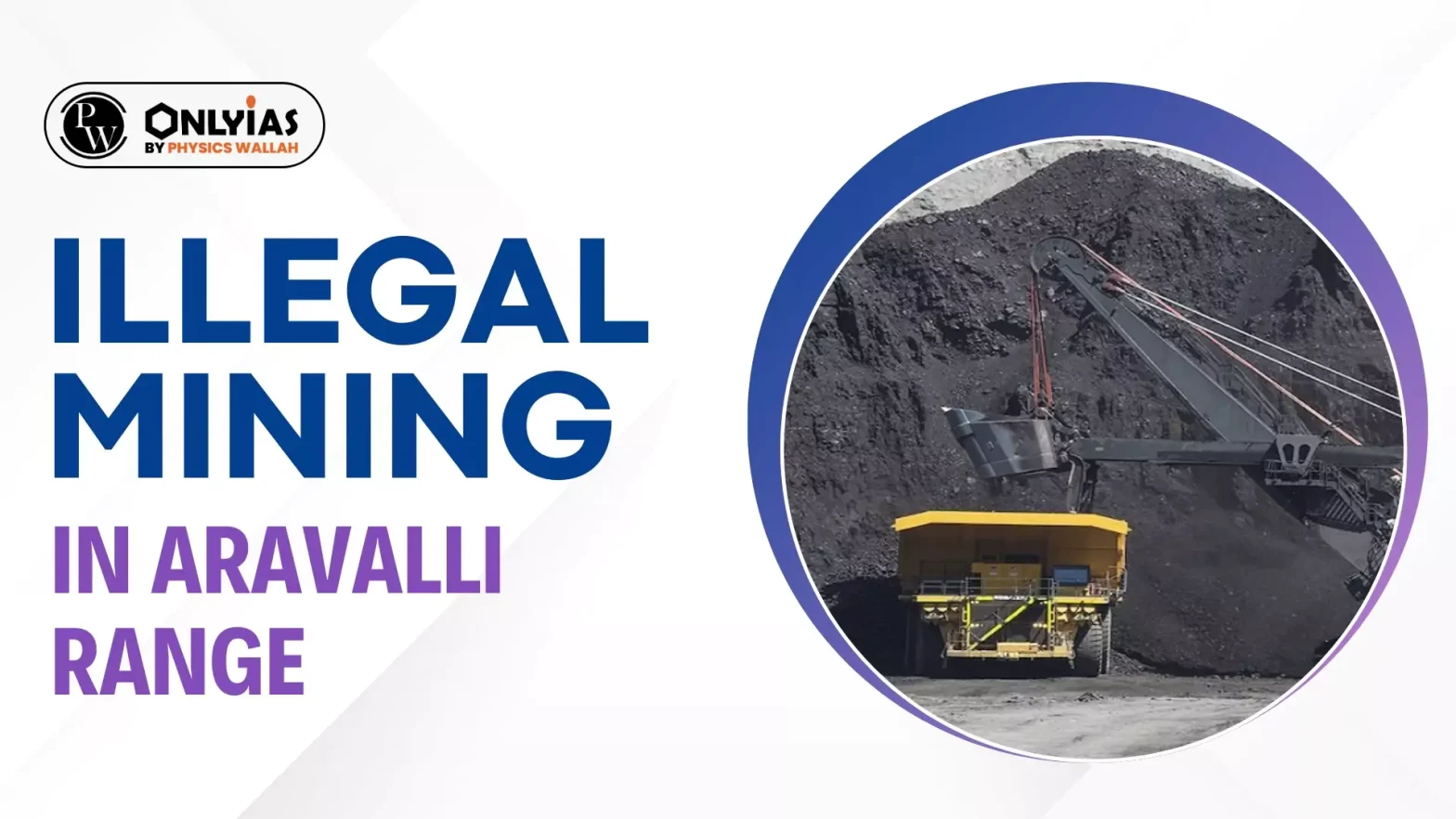Context
Recently, the Supreme Court directed Delhi, Haryana, Rajasthan and Gujarat to not accord final permission for mining activities in the Aravalli hill range until further orders to safeguard the Aravalli ecosystem.
Illegal Mining in Aravalli Range
- Impact on Existing Leases: The ban does not affect existing valid mining leases, ensuring continuity for ongoing mining operations.
- However, stringent regulations and monitoring mechanisms to be implemented to mitigate environmental risks.
- Scrutiny and Approval Process: States are allowed to process mining lease applications within the Aravalli region.
- However, final permission for mining activities requires approval from the Supreme Court, ensuring adherence to environmental norms.
- Formation of Committee for Uniform Definition : To tackle the issue of inconsistent definitions of the Aravalli Hills, the Supreme Court ordered the constitution of a committee..
| Definition of Aravallis Hills & Ranges,According to The Forest Survey of India (FSI) report, defined the Aravallis to include the hills and a uniform 100-meter-wide buffer zone around the downsides of the hills. |
- This committee’s task is to establish a unified definition of the Aravalli range across the concerned states.
-
- The committee shall comprise, among others, the Secretary of MoEF&CC, the secretaries of forest of all these four states and one representative each of the FSI and CEC.
- The aim of this initiative is to streamline regulatory efforts and improve environmental protection measures.
About Aravalli Range
The Aravallis of Northwestern India, one of the oldest fold mountains of the world.
-
- Formation : These are fold mountains of which rocks are formed primarily of folded crust, when two convergent plates move towards each other by the process called orogenic movement.
- The Aravallis date back to the Proterozoic Era when a pre-Indian subcontinent collided with the mainland Eurasian Plate.
- Extent & Location : It extends from Raisina Hills in New Delhi to Khedbrahma and Palanpur in Gujarat,in a south-west direction, passing through southern Haryana and Rajasthan, and ending in Gujarat.
- The total length is approximately 692 kilometers.
- About 80% of this length, which is approximately 550 kilometers, is located in the state of Rajasthan.
- Two, main ranges – the Sambhar Sirohi Range and the Sambhar Khetri Range in Rajasthan,
-
-
-
- Highest Peak : 1722 m (5656 ft) Guru Shikhar (MuntAbu, Arbuda Mountain Ranges)
- Physiography : Aravalli Range as a rough, rocky, and hilly terrain.
- It is characterized by its rugged topography, with rocky outcrops and hilly landscapes.
-
-
- Rivers : Major Flowing rivers Banas, Luni , Sahibi etc
- Minerals : Carbon dating has shown that copper and other metals mined in the ranges date back to at least 5th century BC.
- Major Minerals : Cooper, Zinc, Marble, Lead, Silver etc
- Tribal communities : the Bhil, Bhil-Meena, Meena,Garasia, and others
Enroll now for UPSC Online Course
Significance of Aravalli Range
- Rich Source of Minerals: Non-ferrous minerals like Zinc, Gold, silver and ferrous minerals like Copper ore and lead.
-
- Nonmetallic minerals and building stones like marble, limestone etc.
- Rich Habitat of Biodiversity: it has rich biodiversity, hosting 300 native plant species, 120 bird species, and various unique animals such as jackals and mongooses. etc.
- Combat Desertification: The hills also moderated the wind velocity and checked the spread of the Indian Desert (Thar) towards eastern Rajasthan, Indo Gangetic plains, Haryana and Western UP.
- Important Drainage System: Aravallis have provided a watershed between the Indus basin in the North West and the Ganga basin in the East.
- Rich Forest acts as Green lungs: Its forested patches have acted as green lungs against the air pollution and soil erosion.
- Cultural: The hills and their forests retain cultural importance for local communities like the Gujjars.
- Mount Abu serves as a pilgrimage site for Jains and is a well-visited tourist destination.
Concerns of Mining in Aravalli Range
- Environmental Degradation: Over 25% and 31 hill ranges of the Aravallis in Rajasthan have disappeared due to illegal quarrying.
-
- Loss of diverse flora and fauna, including leopards, striped hyenas, golden jackals, nilgais, and palm civets.
- Rivers originating in the Aravalli like Banas, Luni, Sahibi, and Sakhi have become dry.
- Ecological Impact: Digging or mining to significant depths punctures aquifers, disrupting water flow and resulting in the drying of lakes and the formation of new ones.
-
- Man-wild animal conflicts arise as natural forests along the Aravallis are lost.
- Altered natural drainage patterns threaten the hydrological system and water table in the entire NCR region.
-
- Intergenerational Equity:
- The exploitation of natural resources in the Aravalli range will burden future generations, emphasizing the need for legal frameworks to ensure intergenerational equity.
- Prevalence and Impact of Mining:
- In the absence of proper industrialization and sustainable livelihood sources, communities rely on mining and ancillary industries for income.
- The demand for construction material in NCR and adjacent areas drives mining activities in the Aravalli.
-
- Implementational Challenges:
- Ambiguous law: Regarding inappropriate ownership and the process of privatization of land, No clear defined definition of Forest in particular to the region per se.
Way Forward
-
- Enforcement Measures: Strict implementation of court orders banning indiscriminate mining and construction activities can significantly mitigate the loss of hill ranges in the Aravalli region.
- Reforestation Initiatives: Reforestation efforts can restore the Aravalli to their original vegetation state, similar to the successful restoration undertaken at the Aravalli Biodiversity Park.
- The Great Green Wall Project: Inspired by Africa’s ‘Great Green Wall’ project, India’s ambitious plan aims to establish a 1,400km long and 5 km wide green belt stretching from Gujarat to the Delhi-Haryana border.
- This initiative addresses increasing land degradation rates and the eastward expansion of the Thar desert.
- Community Engagement with proactive support of Government: Idea exchanges, wok shop, Awareness campaign etc.
Enroll now for UPSC Online Classes
![]() 11 May 2024
11 May 2024
